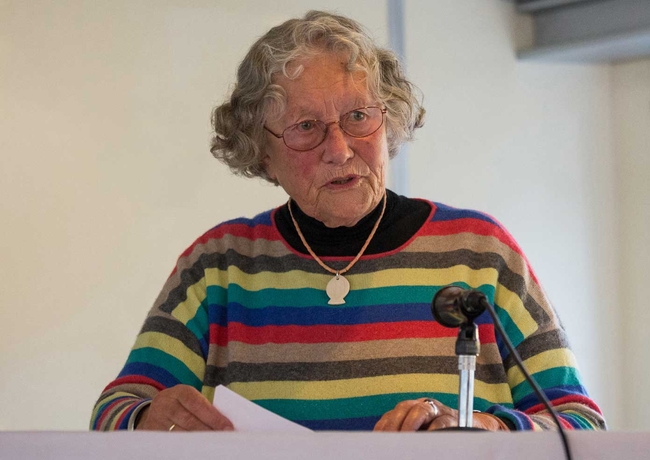Committed scientist and critical companion: In memory of Dr Irmtraut Hempel
The Leibniz Centre for Tropical Marine Research (ZMT) mourns the passing of Dr Irmtraut Hempel (née Schneider), who died on 8 September in Molfsee near Kiel, just a few weeks before what would have been her 101st birthday.
For 73 years Irmtraut Hempel was married to Professor Dr Gotthilf Hempel, the founding director of ZMT, the Alfred Wegener Institute, Helmholtz Centre for Polar and Marine Research (AWI), and the Leibniz Institute for Baltic Sea Research Warnemünde (IOW), and closely linked to these institutions during her life.
One of the first women to sail on German research vessels, she joined Gotthilf Hempel on research expeditions to Namibia, South Africa, and the Red Sea during his time at ZMT.
On behalf of ZMT, Prof Dr Raimund Bleischwitz extends his condolences to her family: “With Irmtraut Hempel we lose an outstanding scientist, who was also an important pioneer for women in marine research. Our thoughts are with her husband, Prof Dr Gotthilf Hempel, our founding director, and with her family.”
Irmtraut Schneider was born on 24 September 1924 in Berlin. She grew up in Berlin and Caputh near Potsdam. From 1946 she studied Biology with a focus on Zoology at the Universities of Heidelberg and Munich. She completed her diploma in 1951, and a year later, her doctorate. In the late 1940s she met her future husband, Gotthilf Hempel. She married him in 1952, shortly before her 28th birthday; he was then 23.
Their two sons were born in 1955 and 1960 — “a long‑cherished wish fulfilled”, as she said in an interview with the Alfred Wegener Institute on the occasion of her 100th birthday.
After periods of living and working on Heligoland, in Hamburg, the USA, France and Italy, she and Gotthilf Hempel moved to the University of Kiel. Their home port since then was a house in Molfsee near the capital of Schleswig‑Holstein. While Gotthilf Hempel made a name for himself as founding director of the Alfred Wegener Institute in Bremerhaven, the ZMT in Bremen, and the Institute for Baltic Sea Research Warnemünde, Irmtraut Hempel worked behind the scenes. Throughout her life she was not only an important support to her husband but also a thoughtful advisor.
She was co‑editor of Biologie der Polarmeere, the “Reports of the German Scientific Commission for Marine Research”, and later Polar Biology. Together with Gotthilf Hempel and Anna‑Katharina Hornidge, she co‑authored a book in cooperation with the ZMT on Bremen’s research at tropical coasts. In this reader entitled Use More Wisely, Protect Better, Bremen tropical researchers vividly describe the natural‑environmental and societal processes in and around coral reefs, seagrass meadows and mangrove forests.
She also regularly attended Gotthilf Hempel’s marine ecological “Dämmerschoppen”, which he started more than 40 years ago in Kiel. On her initiative more than fifteen years ago it was revived in Bremen and has since taken place once a month at ZMT.
Besides science and family, Irmtraut Hempel and her husband devoted themselves to another cause close to their hearts: the preservation of heritage. To restore the altars of old village churches in Mecklenburg the couple founded the “Kirche im Dorf” (Church in the Village) foundation, placing it under the trusteeship of the German Foundation for Monument Preservation.
Irmtraut Hempel stood for values essential in science, especially in international research contexts: empathy, consideration, openness and a willingness to support others. At ZMT she will be remembered as an engaged personality who significantly shaped science, education and culture.
Further reading:
Last year the Alfred Wegener Institute honoured biologist Dr Irmtraut Hempel with a very personal portrait to mark her 100th birthday, which we warmly recommend to all who wish to learn more about her: “A Marriage for Science”:https://www.awi.de/im-fokus/eine-ehe-fuer-die-wissenschaft.html.





